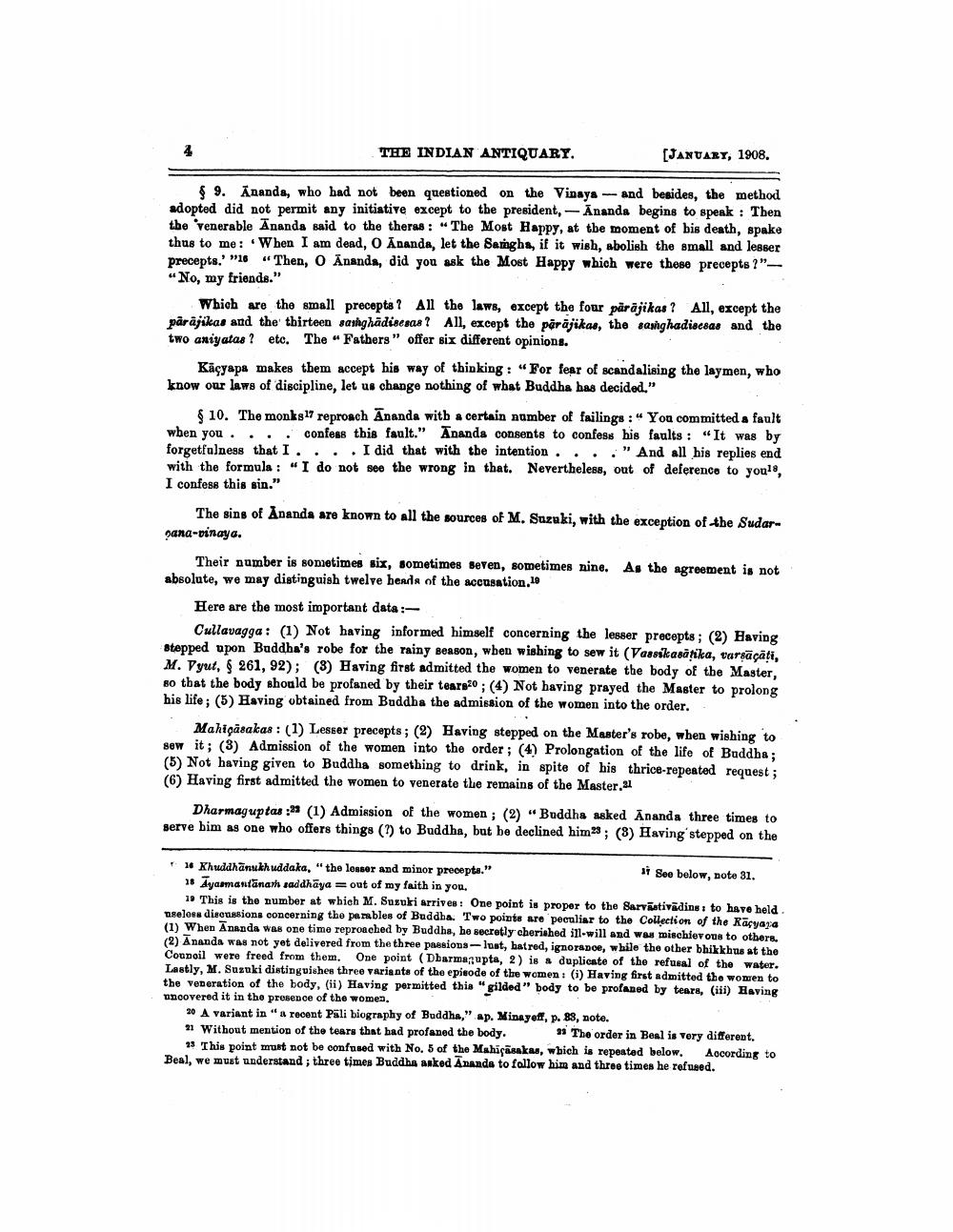________________
THE INDIAN ANTIQUARY.
[JANUARY, 1908.
$ 9. Ananda, who had not been questioned on the Vinaya - and besides, the method adopted did not permit any initiative except to the president, - Ananda begins to speak : Then the venerable Ananda said to the theras: "The Most Happy, at the moment of bis death, spake thus to me: When I am dead, O Ananda, let the Sanghs, if it wish, abolish the small and lesser precepts." "16 " Then, 0 Anands, did you ask the Most Happy which were those precepts ?"“No, my friends."
Which are the small precepta ? All the laws, except the four päräjikas ? All, except the päräjikas and the thirteen sanghädisesas? All, except the päräjikas, the sannghadiacsas and the two aniyatas ? etc. The "Fathers" offer six different opinions.
Kāçyapa makes them accept his way of thinking: "For fear of scandalising the laymen, who know our laws of discipline, let us change nothing of what Buddha has decided."
$ 10. The monks 17 reproach Ananda with a certain number of failings : " You committed a fault when you . .. confess this fault." Ananda consents to confess his faults: “It was by forgetfulness that I.... I did that with the intention ...." And all his replies end with the formula: "I do not see the wrong in that. Nevertheless, out of deferenco to youts, I confess this sin."
The sins of Ananda are known to all the sources of M. Suzuki, with the exception of the Sudargana-vinaya.
Their number is sometimes six, sometimes seven, sometimes nine. As the agreement is not absolute, we may distinguish twelve bends of the accusation,10
Here are the most important data :
Cullavagga : (1) Not having informed himself concerning the lesser precepts; (2) Having stepped upon Buddha's robe for the rainy season, wben wishing to sew it (Vassikasātika, tarsācāti, M. Vyut, 261, 92); (3) Having first admitted the women to venerate the body of the Master, so that the body should be profaned by their tears:0 ; (4) Not having prayed the Master to prolong his life ; (5) Having obtained from Buddha the admission of the women into the order.
Mahipasakas : (1) Lesser precepts; (2) Having stepped on the Master's robe, when wishing to sew it; (3) Admission of the women into the order ; (4) Prolongation of the life of Buddha; (5) Not having given to Buddha something to drink, in spite of his thrice-repeated request; (6) Having first admitted the women to venerate the remains of the Master.21
Dharmaguptas :23 (1) Admission of the women ; (2) "Buddha asked Ananda three times to serve him as one who offers things (9) to Buddha, but be declined him ; (3) Having stepped on the
* Khuddhānukh uddaka, "the lesser and minor precepte."
** See below, note 31. 18 Ayasmantānanh saddhaya = out of my faith in you.
1 This is the number at which M. Suzuki arrives: One point is proper to the Sarvistivādins to have held ogloss discussions concerning the Pambles of Buddha. Two points are peculiar to the Collection of the Kācvara (1) When Ananda Was one time reproached by Buddha, he secretly cherished ill-will and was mischievous to others. (2) Ananda was not yet delivered from the three passions-lust, hatred, ignoranoe, while the other bhikkhus at the Coupoil were freed from them. One point (Dharmanupta, 2) is a duplicate of the refusal of the water. Lastly, M. Suzuki distinguishes three variants of the episode of the women: (i) Having first admitted the women to the veneration of the body, (ii) Having permitted this "gilded" body to be profaned by tears, (iii) Having uncovered it in the presence of the women,
70 A variant in " a recent Pali biography of Buddha," ap. Minayeff, p. 83, note. 1 Without mention of the tears that had profaned the body.
The order in Beel is very different. 15 This point must not be confused with No. 5 of the Mahicāsakas, which is repeated below. According to Beal, we must understand; three times Buddha anked Ananda to follow him and three times he refused.




